ECO4010-N: Impact of Brexit on UK's Trade and Economic Performance
VerifiedAdded on 2023/04/22
|12
|2991
|435
Essay
AI Summary
This essay provides a detailed analysis of the potential impacts of Brexit on the UK economy, focusing on trade, foreign investment, migration, economic growth, and the UK's global position. It examines the effects of Brexit on trade with the EU, highlighting potential disruptions, trade barriers, and impacts on industries like agriculture and financial services. The essay also explores the implications for foreign direct investment, the business environment, and overall economic growth, including predictions of recession and changes in GDP. Furthermore, it addresses the effects of Brexit on labor markets, migration, and inflation, as well as the UK's standing in the global market. The essay concludes by summarizing the mixed impacts of Brexit on the UK's short-term and long-term economic prospects, emphasizing trade diversion and challenges to the UK's influence in the global market.
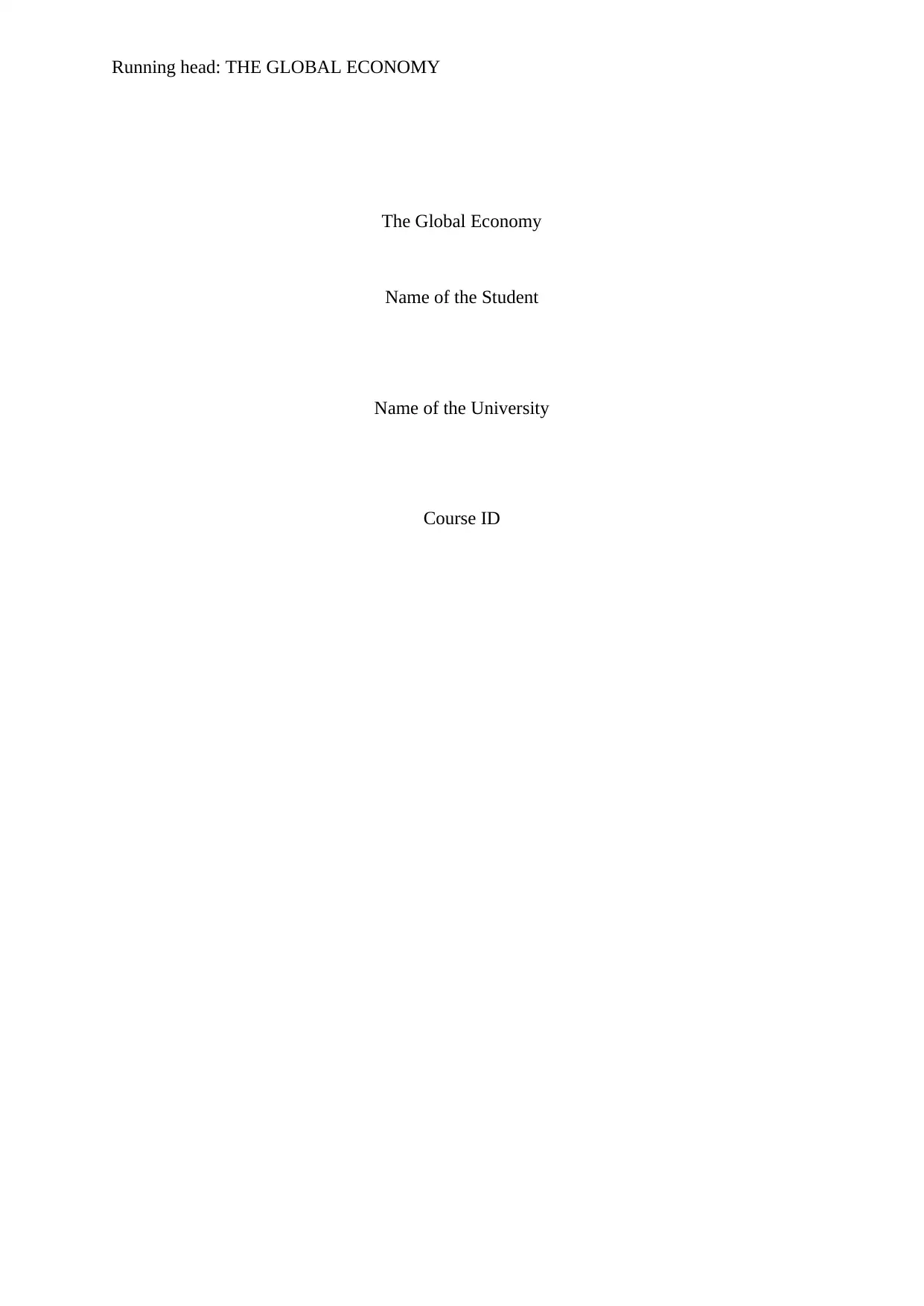
Running head: THE GLOBAL ECONOMY
The Global Economy
Name of the Student
Name of the University
Course ID
The Global Economy
Name of the Student
Name of the University
Course ID
Paraphrase This Document
Need a fresh take? Get an instant paraphrase of this document with our AI Paraphraser
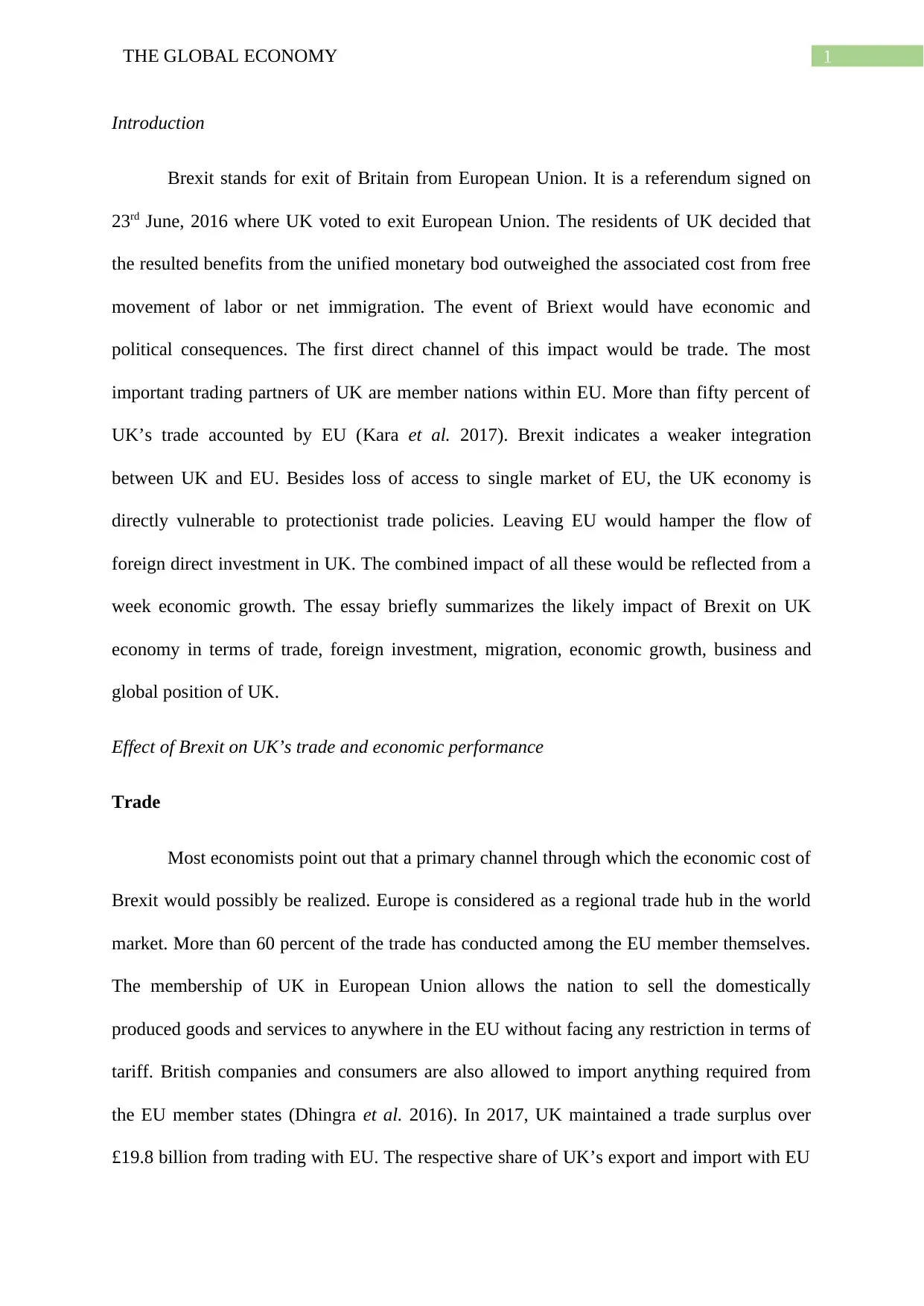
1THE GLOBAL ECONOMY
Introduction
Brexit stands for exit of Britain from European Union. It is a referendum signed on
23rd June, 2016 where UK voted to exit European Union. The residents of UK decided that
the resulted benefits from the unified monetary bod outweighed the associated cost from free
movement of labor or net immigration. The event of Briext would have economic and
political consequences. The first direct channel of this impact would be trade. The most
important trading partners of UK are member nations within EU. More than fifty percent of
UK’s trade accounted by EU (Kara et al. 2017). Brexit indicates a weaker integration
between UK and EU. Besides loss of access to single market of EU, the UK economy is
directly vulnerable to protectionist trade policies. Leaving EU would hamper the flow of
foreign direct investment in UK. The combined impact of all these would be reflected from a
week economic growth. The essay briefly summarizes the likely impact of Brexit on UK
economy in terms of trade, foreign investment, migration, economic growth, business and
global position of UK.
Effect of Brexit on UK’s trade and economic performance
Trade
Most economists point out that a primary channel through which the economic cost of
Brexit would possibly be realized. Europe is considered as a regional trade hub in the world
market. More than 60 percent of the trade has conducted among the EU member themselves.
The membership of UK in European Union allows the nation to sell the domestically
produced goods and services to anywhere in the EU without facing any restriction in terms of
tariff. British companies and consumers are also allowed to import anything required from
the EU member states (Dhingra et al. 2016). In 2017, UK maintained a trade surplus over
£19.8 billion from trading with EU. The respective share of UK’s export and import with EU
Introduction
Brexit stands for exit of Britain from European Union. It is a referendum signed on
23rd June, 2016 where UK voted to exit European Union. The residents of UK decided that
the resulted benefits from the unified monetary bod outweighed the associated cost from free
movement of labor or net immigration. The event of Briext would have economic and
political consequences. The first direct channel of this impact would be trade. The most
important trading partners of UK are member nations within EU. More than fifty percent of
UK’s trade accounted by EU (Kara et al. 2017). Brexit indicates a weaker integration
between UK and EU. Besides loss of access to single market of EU, the UK economy is
directly vulnerable to protectionist trade policies. Leaving EU would hamper the flow of
foreign direct investment in UK. The combined impact of all these would be reflected from a
week economic growth. The essay briefly summarizes the likely impact of Brexit on UK
economy in terms of trade, foreign investment, migration, economic growth, business and
global position of UK.
Effect of Brexit on UK’s trade and economic performance
Trade
Most economists point out that a primary channel through which the economic cost of
Brexit would possibly be realized. Europe is considered as a regional trade hub in the world
market. More than 60 percent of the trade has conducted among the EU member themselves.
The membership of UK in European Union allows the nation to sell the domestically
produced goods and services to anywhere in the EU without facing any restriction in terms of
tariff. British companies and consumers are also allowed to import anything required from
the EU member states (Dhingra et al. 2016). In 2017, UK maintained a trade surplus over
£19.8 billion from trading with EU. The respective share of UK’s export and import with EU
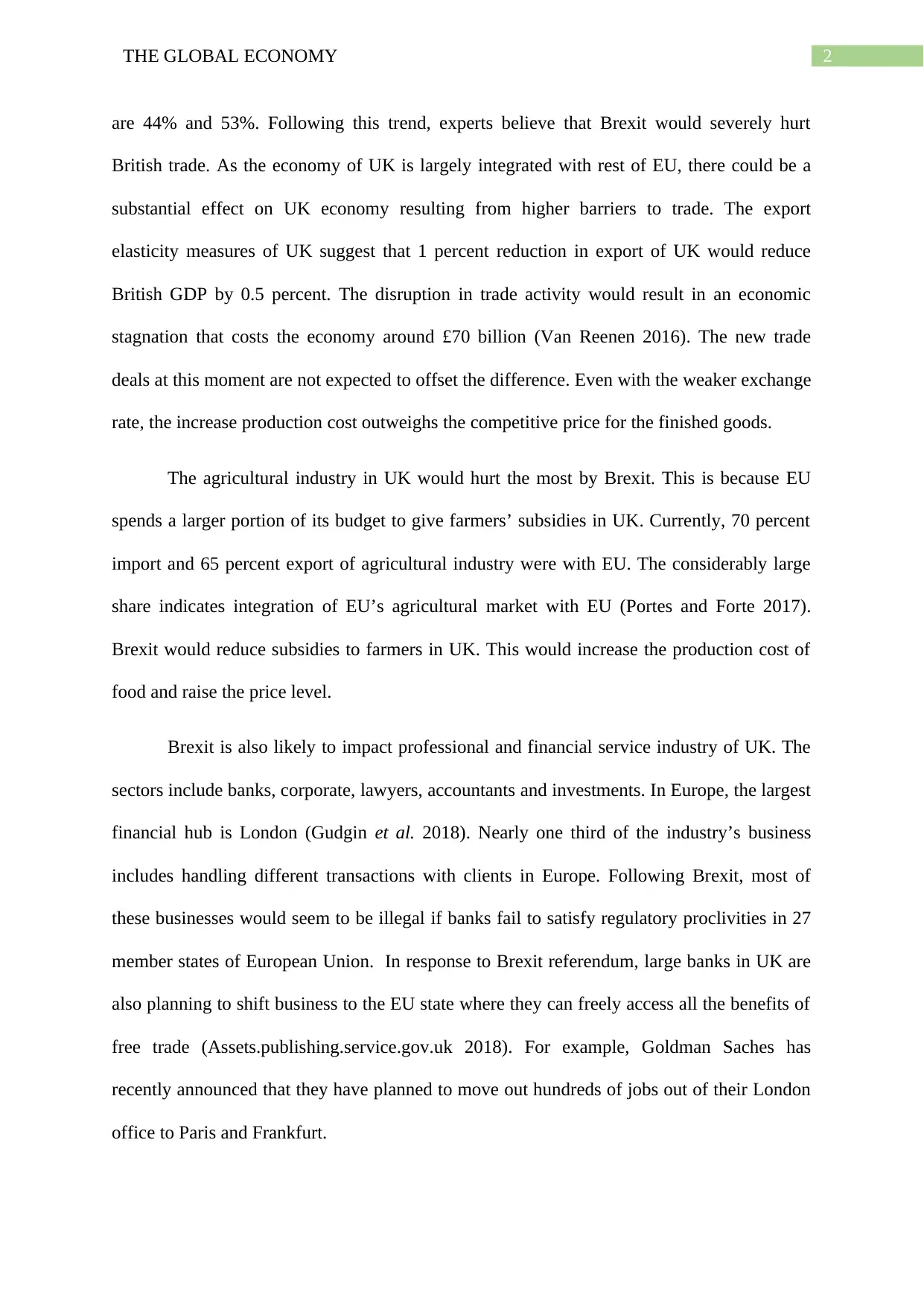
2THE GLOBAL ECONOMY
are 44% and 53%. Following this trend, experts believe that Brexit would severely hurt
British trade. As the economy of UK is largely integrated with rest of EU, there could be a
substantial effect on UK economy resulting from higher barriers to trade. The export
elasticity measures of UK suggest that 1 percent reduction in export of UK would reduce
British GDP by 0.5 percent. The disruption in trade activity would result in an economic
stagnation that costs the economy around £70 billion (Van Reenen 2016). The new trade
deals at this moment are not expected to offset the difference. Even with the weaker exchange
rate, the increase production cost outweighs the competitive price for the finished goods.
The agricultural industry in UK would hurt the most by Brexit. This is because EU
spends a larger portion of its budget to give farmers’ subsidies in UK. Currently, 70 percent
import and 65 percent export of agricultural industry were with EU. The considerably large
share indicates integration of EU’s agricultural market with EU (Portes and Forte 2017).
Brexit would reduce subsidies to farmers in UK. This would increase the production cost of
food and raise the price level.
Brexit is also likely to impact professional and financial service industry of UK. The
sectors include banks, corporate, lawyers, accountants and investments. In Europe, the largest
financial hub is London (Gudgin et al. 2018). Nearly one third of the industry’s business
includes handling different transactions with clients in Europe. Following Brexit, most of
these businesses would seem to be illegal if banks fail to satisfy regulatory proclivities in 27
member states of European Union. In response to Brexit referendum, large banks in UK are
also planning to shift business to the EU state where they can freely access all the benefits of
free trade (Assets.publishing.service.gov.uk 2018). For example, Goldman Saches has
recently announced that they have planned to move out hundreds of jobs out of their London
office to Paris and Frankfurt.
are 44% and 53%. Following this trend, experts believe that Brexit would severely hurt
British trade. As the economy of UK is largely integrated with rest of EU, there could be a
substantial effect on UK economy resulting from higher barriers to trade. The export
elasticity measures of UK suggest that 1 percent reduction in export of UK would reduce
British GDP by 0.5 percent. The disruption in trade activity would result in an economic
stagnation that costs the economy around £70 billion (Van Reenen 2016). The new trade
deals at this moment are not expected to offset the difference. Even with the weaker exchange
rate, the increase production cost outweighs the competitive price for the finished goods.
The agricultural industry in UK would hurt the most by Brexit. This is because EU
spends a larger portion of its budget to give farmers’ subsidies in UK. Currently, 70 percent
import and 65 percent export of agricultural industry were with EU. The considerably large
share indicates integration of EU’s agricultural market with EU (Portes and Forte 2017).
Brexit would reduce subsidies to farmers in UK. This would increase the production cost of
food and raise the price level.
Brexit is also likely to impact professional and financial service industry of UK. The
sectors include banks, corporate, lawyers, accountants and investments. In Europe, the largest
financial hub is London (Gudgin et al. 2018). Nearly one third of the industry’s business
includes handling different transactions with clients in Europe. Following Brexit, most of
these businesses would seem to be illegal if banks fail to satisfy regulatory proclivities in 27
member states of European Union. In response to Brexit referendum, large banks in UK are
also planning to shift business to the EU state where they can freely access all the benefits of
free trade (Assets.publishing.service.gov.uk 2018). For example, Goldman Saches has
recently announced that they have planned to move out hundreds of jobs out of their London
office to Paris and Frankfurt.
⊘ This is a preview!⊘
Do you want full access?
Subscribe today to unlock all pages.

Trusted by 1+ million students worldwide
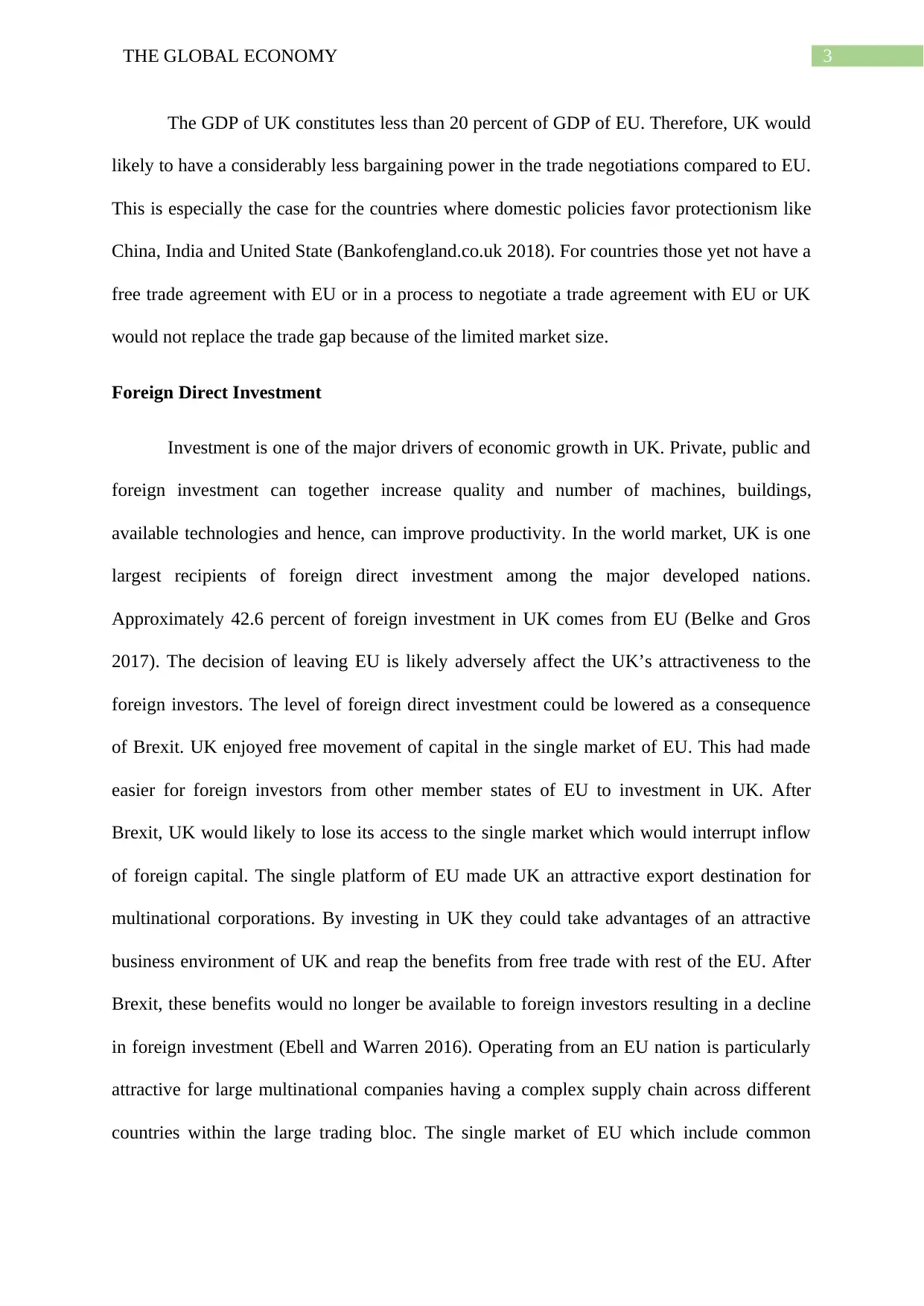
3THE GLOBAL ECONOMY
The GDP of UK constitutes less than 20 percent of GDP of EU. Therefore, UK would
likely to have a considerably less bargaining power in the trade negotiations compared to EU.
This is especially the case for the countries where domestic policies favor protectionism like
China, India and United State (Bankofengland.co.uk 2018). For countries those yet not have a
free trade agreement with EU or in a process to negotiate a trade agreement with EU or UK
would not replace the trade gap because of the limited market size.
Foreign Direct Investment
Investment is one of the major drivers of economic growth in UK. Private, public and
foreign investment can together increase quality and number of machines, buildings,
available technologies and hence, can improve productivity. In the world market, UK is one
largest recipients of foreign direct investment among the major developed nations.
Approximately 42.6 percent of foreign investment in UK comes from EU (Belke and Gros
2017). The decision of leaving EU is likely adversely affect the UK’s attractiveness to the
foreign investors. The level of foreign direct investment could be lowered as a consequence
of Brexit. UK enjoyed free movement of capital in the single market of EU. This had made
easier for foreign investors from other member states of EU to investment in UK. After
Brexit, UK would likely to lose its access to the single market which would interrupt inflow
of foreign capital. The single platform of EU made UK an attractive export destination for
multinational corporations. By investing in UK they could take advantages of an attractive
business environment of UK and reap the benefits from free trade with rest of the EU. After
Brexit, these benefits would no longer be available to foreign investors resulting in a decline
in foreign investment (Ebell and Warren 2016). Operating from an EU nation is particularly
attractive for large multinational companies having a complex supply chain across different
countries within the large trading bloc. The single market of EU which include common
The GDP of UK constitutes less than 20 percent of GDP of EU. Therefore, UK would
likely to have a considerably less bargaining power in the trade negotiations compared to EU.
This is especially the case for the countries where domestic policies favor protectionism like
China, India and United State (Bankofengland.co.uk 2018). For countries those yet not have a
free trade agreement with EU or in a process to negotiate a trade agreement with EU or UK
would not replace the trade gap because of the limited market size.
Foreign Direct Investment
Investment is one of the major drivers of economic growth in UK. Private, public and
foreign investment can together increase quality and number of machines, buildings,
available technologies and hence, can improve productivity. In the world market, UK is one
largest recipients of foreign direct investment among the major developed nations.
Approximately 42.6 percent of foreign investment in UK comes from EU (Belke and Gros
2017). The decision of leaving EU is likely adversely affect the UK’s attractiveness to the
foreign investors. The level of foreign direct investment could be lowered as a consequence
of Brexit. UK enjoyed free movement of capital in the single market of EU. This had made
easier for foreign investors from other member states of EU to investment in UK. After
Brexit, UK would likely to lose its access to the single market which would interrupt inflow
of foreign capital. The single platform of EU made UK an attractive export destination for
multinational corporations. By investing in UK they could take advantages of an attractive
business environment of UK and reap the benefits from free trade with rest of the EU. After
Brexit, these benefits would no longer be available to foreign investors resulting in a decline
in foreign investment (Ebell and Warren 2016). Operating from an EU nation is particularly
attractive for large multinational companies having a complex supply chain across different
countries within the large trading bloc. The single market of EU which include common
Paraphrase This Document
Need a fresh take? Get an instant paraphrase of this document with our AI Paraphraser
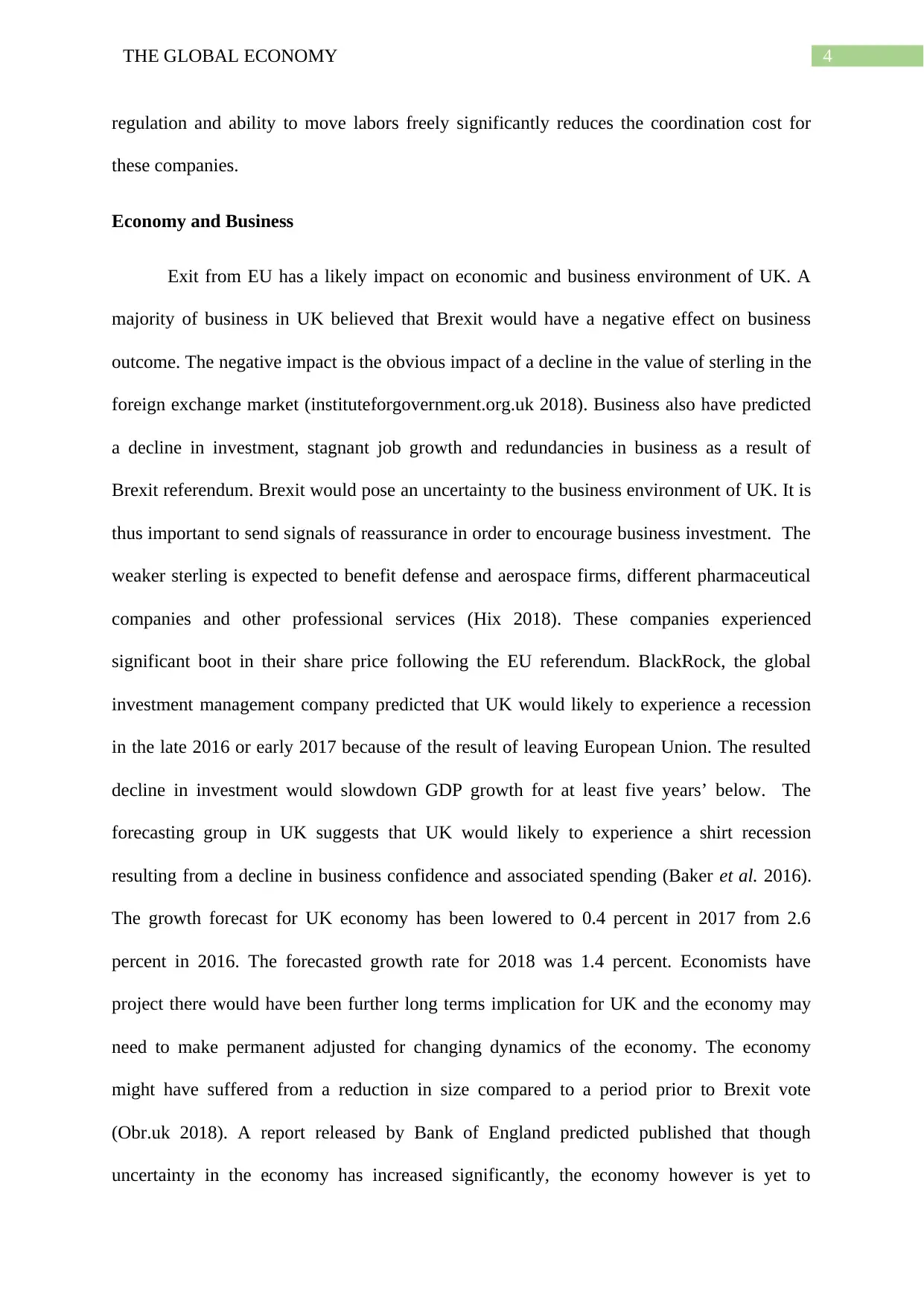
4THE GLOBAL ECONOMY
regulation and ability to move labors freely significantly reduces the coordination cost for
these companies.
Economy and Business
Exit from EU has a likely impact on economic and business environment of UK. A
majority of business in UK believed that Brexit would have a negative effect on business
outcome. The negative impact is the obvious impact of a decline in the value of sterling in the
foreign exchange market (instituteforgovernment.org.uk 2018). Business also have predicted
a decline in investment, stagnant job growth and redundancies in business as a result of
Brexit referendum. Brexit would pose an uncertainty to the business environment of UK. It is
thus important to send signals of reassurance in order to encourage business investment. The
weaker sterling is expected to benefit defense and aerospace firms, different pharmaceutical
companies and other professional services (Hix 2018). These companies experienced
significant boot in their share price following the EU referendum. BlackRock, the global
investment management company predicted that UK would likely to experience a recession
in the late 2016 or early 2017 because of the result of leaving European Union. The resulted
decline in investment would slowdown GDP growth for at least five years’ below. The
forecasting group in UK suggests that UK would likely to experience a shirt recession
resulting from a decline in business confidence and associated spending (Baker et al. 2016).
The growth forecast for UK economy has been lowered to 0.4 percent in 2017 from 2.6
percent in 2016. The forecasted growth rate for 2018 was 1.4 percent. Economists have
project there would have been further long terms implication for UK and the economy may
need to make permanent adjusted for changing dynamics of the economy. The economy
might have suffered from a reduction in size compared to a period prior to Brexit vote
(Obr.uk 2018). A report released by Bank of England predicted published that though
uncertainty in the economy has increased significantly, the economy however is yet to
regulation and ability to move labors freely significantly reduces the coordination cost for
these companies.
Economy and Business
Exit from EU has a likely impact on economic and business environment of UK. A
majority of business in UK believed that Brexit would have a negative effect on business
outcome. The negative impact is the obvious impact of a decline in the value of sterling in the
foreign exchange market (instituteforgovernment.org.uk 2018). Business also have predicted
a decline in investment, stagnant job growth and redundancies in business as a result of
Brexit referendum. Brexit would pose an uncertainty to the business environment of UK. It is
thus important to send signals of reassurance in order to encourage business investment. The
weaker sterling is expected to benefit defense and aerospace firms, different pharmaceutical
companies and other professional services (Hix 2018). These companies experienced
significant boot in their share price following the EU referendum. BlackRock, the global
investment management company predicted that UK would likely to experience a recession
in the late 2016 or early 2017 because of the result of leaving European Union. The resulted
decline in investment would slowdown GDP growth for at least five years’ below. The
forecasting group in UK suggests that UK would likely to experience a shirt recession
resulting from a decline in business confidence and associated spending (Baker et al. 2016).
The growth forecast for UK economy has been lowered to 0.4 percent in 2017 from 2.6
percent in 2016. The forecasted growth rate for 2018 was 1.4 percent. Economists have
project there would have been further long terms implication for UK and the economy may
need to make permanent adjusted for changing dynamics of the economy. The economy
might have suffered from a reduction in size compared to a period prior to Brexit vote
(Obr.uk 2018). A report released by Bank of England predicted published that though
uncertainty in the economy has increased significantly, the economy however is yet to
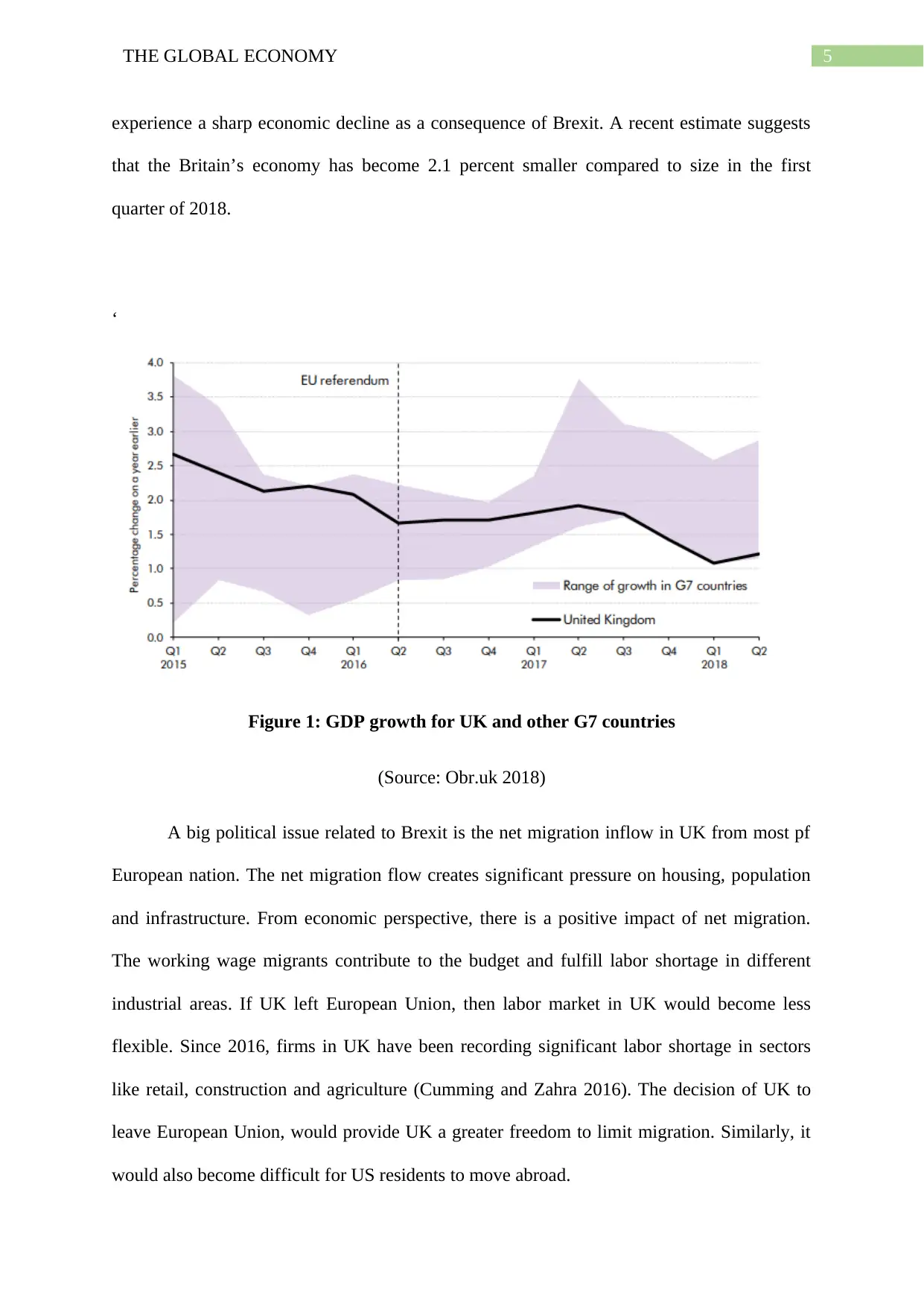
5THE GLOBAL ECONOMY
experience a sharp economic decline as a consequence of Brexit. A recent estimate suggests
that the Britain’s economy has become 2.1 percent smaller compared to size in the first
quarter of 2018.
‘
Figure 1: GDP growth for UK and other G7 countries
(Source: Obr.uk 2018)
A big political issue related to Brexit is the net migration inflow in UK from most pf
European nation. The net migration flow creates significant pressure on housing, population
and infrastructure. From economic perspective, there is a positive impact of net migration.
The working wage migrants contribute to the budget and fulfill labor shortage in different
industrial areas. If UK left European Union, then labor market in UK would become less
flexible. Since 2016, firms in UK have been recording significant labor shortage in sectors
like retail, construction and agriculture (Cumming and Zahra 2016). The decision of UK to
leave European Union, would provide UK a greater freedom to limit migration. Similarly, it
would also become difficult for US residents to move abroad.
experience a sharp economic decline as a consequence of Brexit. A recent estimate suggests
that the Britain’s economy has become 2.1 percent smaller compared to size in the first
quarter of 2018.
‘
Figure 1: GDP growth for UK and other G7 countries
(Source: Obr.uk 2018)
A big political issue related to Brexit is the net migration inflow in UK from most pf
European nation. The net migration flow creates significant pressure on housing, population
and infrastructure. From economic perspective, there is a positive impact of net migration.
The working wage migrants contribute to the budget and fulfill labor shortage in different
industrial areas. If UK left European Union, then labor market in UK would become less
flexible. Since 2016, firms in UK have been recording significant labor shortage in sectors
like retail, construction and agriculture (Cumming and Zahra 2016). The decision of UK to
leave European Union, would provide UK a greater freedom to limit migration. Similarly, it
would also become difficult for US residents to move abroad.
⊘ This is a preview!⊘
Do you want full access?
Subscribe today to unlock all pages.

Trusted by 1+ million students worldwide
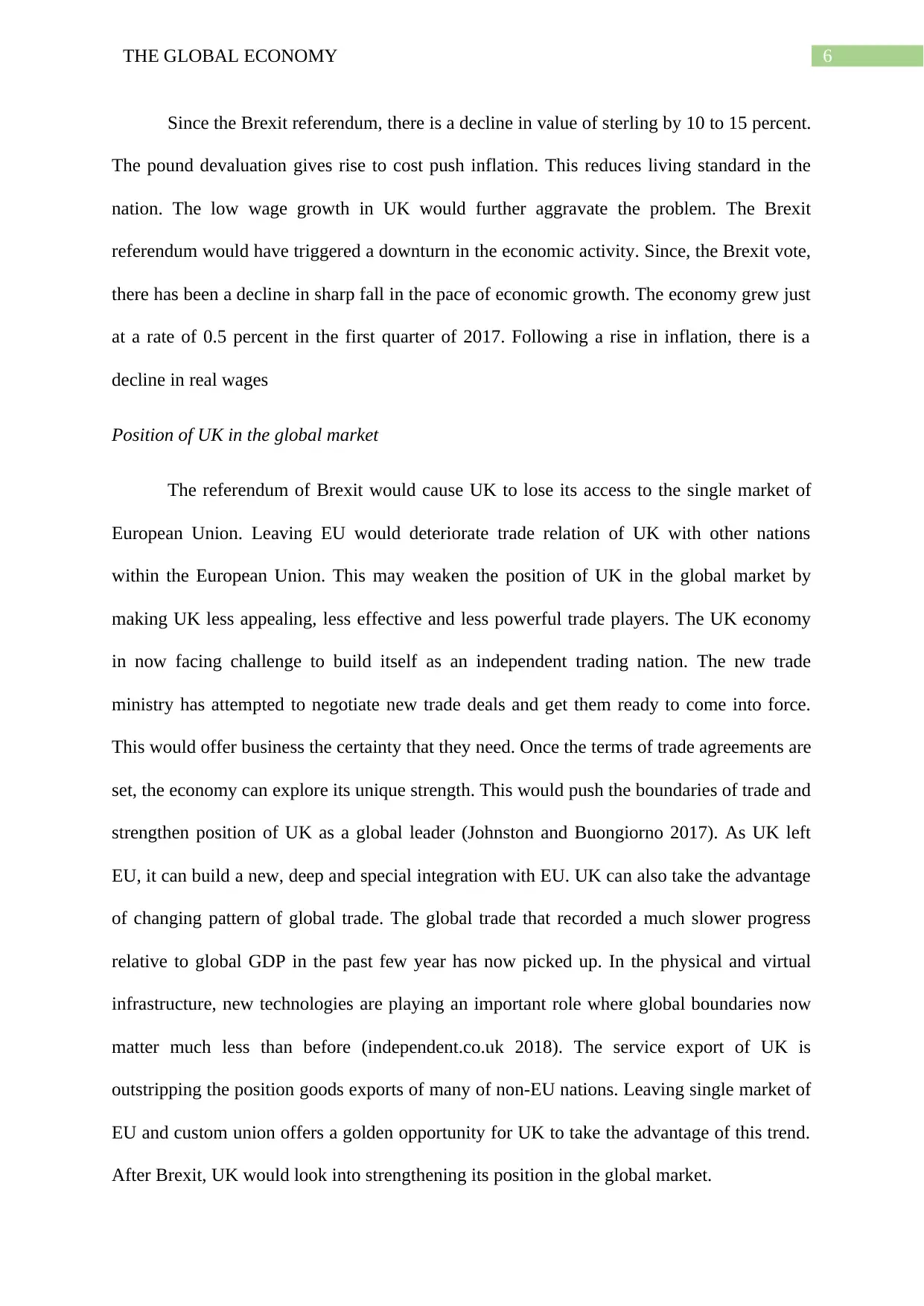
6THE GLOBAL ECONOMY
Since the Brexit referendum, there is a decline in value of sterling by 10 to 15 percent.
The pound devaluation gives rise to cost push inflation. This reduces living standard in the
nation. The low wage growth in UK would further aggravate the problem. The Brexit
referendum would have triggered a downturn in the economic activity. Since, the Brexit vote,
there has been a decline in sharp fall in the pace of economic growth. The economy grew just
at a rate of 0.5 percent in the first quarter of 2017. Following a rise in inflation, there is a
decline in real wages
Position of UK in the global market
The referendum of Brexit would cause UK to lose its access to the single market of
European Union. Leaving EU would deteriorate trade relation of UK with other nations
within the European Union. This may weaken the position of UK in the global market by
making UK less appealing, less effective and less powerful trade players. The UK economy
in now facing challenge to build itself as an independent trading nation. The new trade
ministry has attempted to negotiate new trade deals and get them ready to come into force.
This would offer business the certainty that they need. Once the terms of trade agreements are
set, the economy can explore its unique strength. This would push the boundaries of trade and
strengthen position of UK as a global leader (Johnston and Buongiorno 2017). As UK left
EU, it can build a new, deep and special integration with EU. UK can also take the advantage
of changing pattern of global trade. The global trade that recorded a much slower progress
relative to global GDP in the past few year has now picked up. In the physical and virtual
infrastructure, new technologies are playing an important role where global boundaries now
matter much less than before (independent.co.uk 2018). The service export of UK is
outstripping the position goods exports of many of non-EU nations. Leaving single market of
EU and custom union offers a golden opportunity for UK to take the advantage of this trend.
After Brexit, UK would look into strengthening its position in the global market.
Since the Brexit referendum, there is a decline in value of sterling by 10 to 15 percent.
The pound devaluation gives rise to cost push inflation. This reduces living standard in the
nation. The low wage growth in UK would further aggravate the problem. The Brexit
referendum would have triggered a downturn in the economic activity. Since, the Brexit vote,
there has been a decline in sharp fall in the pace of economic growth. The economy grew just
at a rate of 0.5 percent in the first quarter of 2017. Following a rise in inflation, there is a
decline in real wages
Position of UK in the global market
The referendum of Brexit would cause UK to lose its access to the single market of
European Union. Leaving EU would deteriorate trade relation of UK with other nations
within the European Union. This may weaken the position of UK in the global market by
making UK less appealing, less effective and less powerful trade players. The UK economy
in now facing challenge to build itself as an independent trading nation. The new trade
ministry has attempted to negotiate new trade deals and get them ready to come into force.
This would offer business the certainty that they need. Once the terms of trade agreements are
set, the economy can explore its unique strength. This would push the boundaries of trade and
strengthen position of UK as a global leader (Johnston and Buongiorno 2017). As UK left
EU, it can build a new, deep and special integration with EU. UK can also take the advantage
of changing pattern of global trade. The global trade that recorded a much slower progress
relative to global GDP in the past few year has now picked up. In the physical and virtual
infrastructure, new technologies are playing an important role where global boundaries now
matter much less than before (independent.co.uk 2018). The service export of UK is
outstripping the position goods exports of many of non-EU nations. Leaving single market of
EU and custom union offers a golden opportunity for UK to take the advantage of this trend.
After Brexit, UK would look into strengthening its position in the global market.
Paraphrase This Document
Need a fresh take? Get an instant paraphrase of this document with our AI Paraphraser

7THE GLOBAL ECONOMY
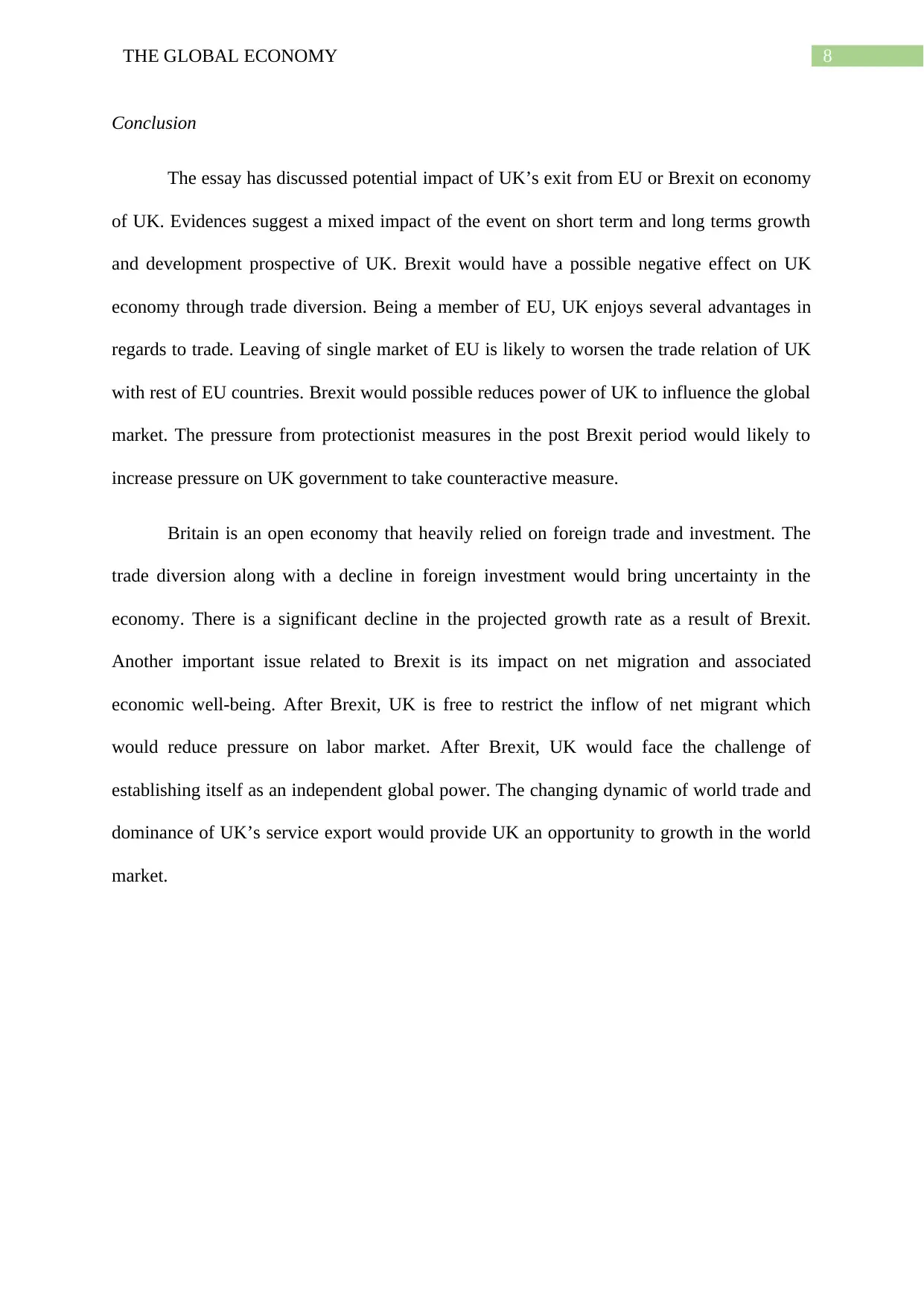
8THE GLOBAL ECONOMY
Conclusion
The essay has discussed potential impact of UK’s exit from EU or Brexit on economy
of UK. Evidences suggest a mixed impact of the event on short term and long terms growth
and development prospective of UK. Brexit would have a possible negative effect on UK
economy through trade diversion. Being a member of EU, UK enjoys several advantages in
regards to trade. Leaving of single market of EU is likely to worsen the trade relation of UK
with rest of EU countries. Brexit would possible reduces power of UK to influence the global
market. The pressure from protectionist measures in the post Brexit period would likely to
increase pressure on UK government to take counteractive measure.
Britain is an open economy that heavily relied on foreign trade and investment. The
trade diversion along with a decline in foreign investment would bring uncertainty in the
economy. There is a significant decline in the projected growth rate as a result of Brexit.
Another important issue related to Brexit is its impact on net migration and associated
economic well-being. After Brexit, UK is free to restrict the inflow of net migrant which
would reduce pressure on labor market. After Brexit, UK would face the challenge of
establishing itself as an independent global power. The changing dynamic of world trade and
dominance of UK’s service export would provide UK an opportunity to growth in the world
market.
Conclusion
The essay has discussed potential impact of UK’s exit from EU or Brexit on economy
of UK. Evidences suggest a mixed impact of the event on short term and long terms growth
and development prospective of UK. Brexit would have a possible negative effect on UK
economy through trade diversion. Being a member of EU, UK enjoys several advantages in
regards to trade. Leaving of single market of EU is likely to worsen the trade relation of UK
with rest of EU countries. Brexit would possible reduces power of UK to influence the global
market. The pressure from protectionist measures in the post Brexit period would likely to
increase pressure on UK government to take counteractive measure.
Britain is an open economy that heavily relied on foreign trade and investment. The
trade diversion along with a decline in foreign investment would bring uncertainty in the
economy. There is a significant decline in the projected growth rate as a result of Brexit.
Another important issue related to Brexit is its impact on net migration and associated
economic well-being. After Brexit, UK is free to restrict the inflow of net migrant which
would reduce pressure on labor market. After Brexit, UK would face the challenge of
establishing itself as an independent global power. The changing dynamic of world trade and
dominance of UK’s service export would provide UK an opportunity to growth in the world
market.
⊘ This is a preview!⊘
Do you want full access?
Subscribe today to unlock all pages.

Trusted by 1+ million students worldwide
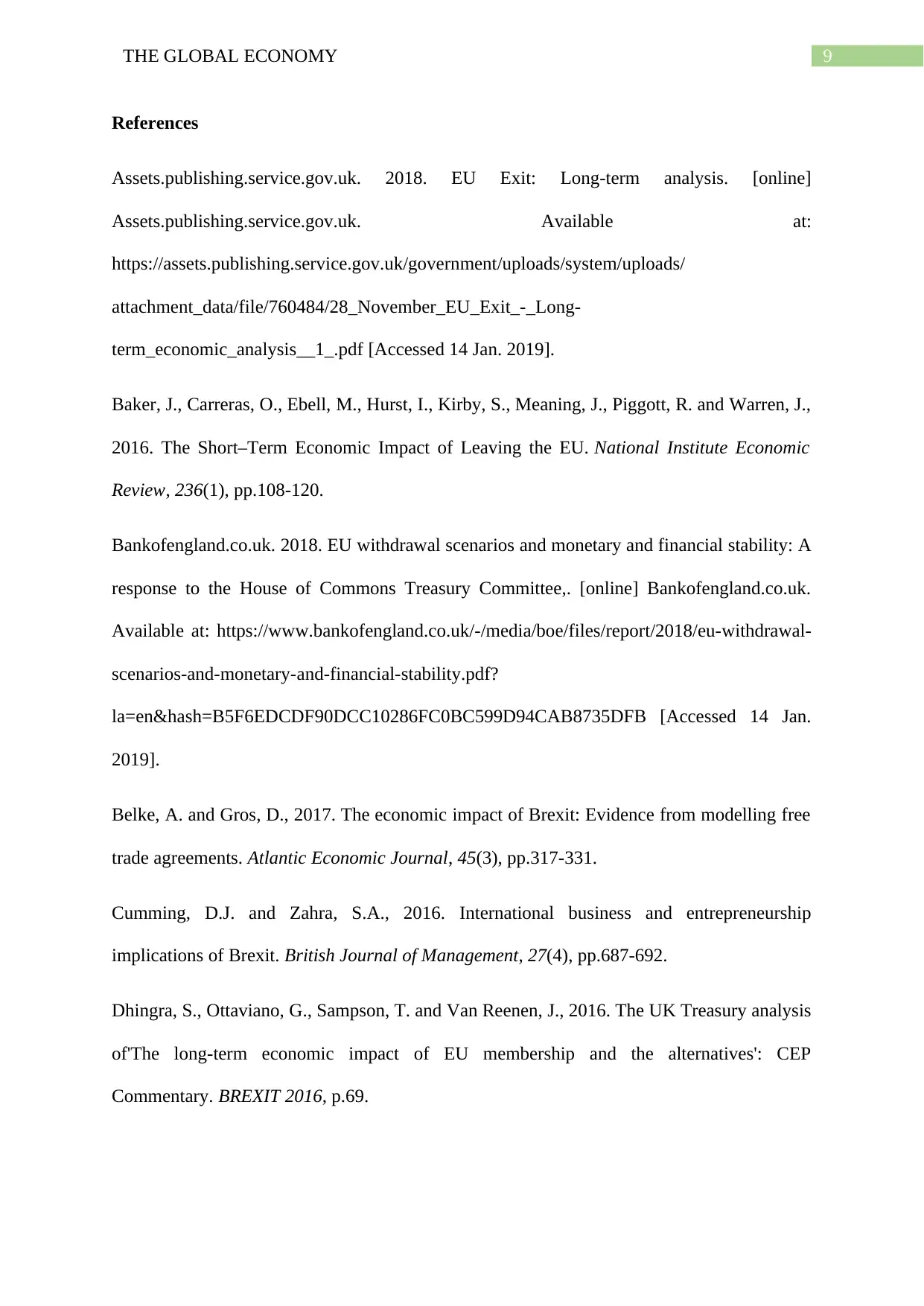
9THE GLOBAL ECONOMY
References
Assets.publishing.service.gov.uk. 2018. EU Exit: Long-term analysis. [online]
Assets.publishing.service.gov.uk. Available at:
https://assets.publishing.service.gov.uk/government/uploads/system/uploads/
attachment_data/file/760484/28_November_EU_Exit_-_Long-
term_economic_analysis__1_.pdf [Accessed 14 Jan. 2019].
Baker, J., Carreras, O., Ebell, M., Hurst, I., Kirby, S., Meaning, J., Piggott, R. and Warren, J.,
2016. The Short–Term Economic Impact of Leaving the EU. National Institute Economic
Review, 236(1), pp.108-120.
Bankofengland.co.uk. 2018. EU withdrawal scenarios and monetary and financial stability: A
response to the House of Commons Treasury Committee,. [online] Bankofengland.co.uk.
Available at: https://www.bankofengland.co.uk/-/media/boe/files/report/2018/eu-withdrawal-
scenarios-and-monetary-and-financial-stability.pdf?
la=en&hash=B5F6EDCDF90DCC10286FC0BC599D94CAB8735DFB [Accessed 14 Jan.
2019].
Belke, A. and Gros, D., 2017. The economic impact of Brexit: Evidence from modelling free
trade agreements. Atlantic Economic Journal, 45(3), pp.317-331.
Cumming, D.J. and Zahra, S.A., 2016. International business and entrepreneurship
implications of Brexit. British Journal of Management, 27(4), pp.687-692.
Dhingra, S., Ottaviano, G., Sampson, T. and Van Reenen, J., 2016. The UK Treasury analysis
of'The long-term economic impact of EU membership and the alternatives': CEP
Commentary. BREXIT 2016, p.69.
References
Assets.publishing.service.gov.uk. 2018. EU Exit: Long-term analysis. [online]
Assets.publishing.service.gov.uk. Available at:
https://assets.publishing.service.gov.uk/government/uploads/system/uploads/
attachment_data/file/760484/28_November_EU_Exit_-_Long-
term_economic_analysis__1_.pdf [Accessed 14 Jan. 2019].
Baker, J., Carreras, O., Ebell, M., Hurst, I., Kirby, S., Meaning, J., Piggott, R. and Warren, J.,
2016. The Short–Term Economic Impact of Leaving the EU. National Institute Economic
Review, 236(1), pp.108-120.
Bankofengland.co.uk. 2018. EU withdrawal scenarios and monetary and financial stability: A
response to the House of Commons Treasury Committee,. [online] Bankofengland.co.uk.
Available at: https://www.bankofengland.co.uk/-/media/boe/files/report/2018/eu-withdrawal-
scenarios-and-monetary-and-financial-stability.pdf?
la=en&hash=B5F6EDCDF90DCC10286FC0BC599D94CAB8735DFB [Accessed 14 Jan.
2019].
Belke, A. and Gros, D., 2017. The economic impact of Brexit: Evidence from modelling free
trade agreements. Atlantic Economic Journal, 45(3), pp.317-331.
Cumming, D.J. and Zahra, S.A., 2016. International business and entrepreneurship
implications of Brexit. British Journal of Management, 27(4), pp.687-692.
Dhingra, S., Ottaviano, G., Sampson, T. and Van Reenen, J., 2016. The UK Treasury analysis
of'The long-term economic impact of EU membership and the alternatives': CEP
Commentary. BREXIT 2016, p.69.
Paraphrase This Document
Need a fresh take? Get an instant paraphrase of this document with our AI Paraphraser
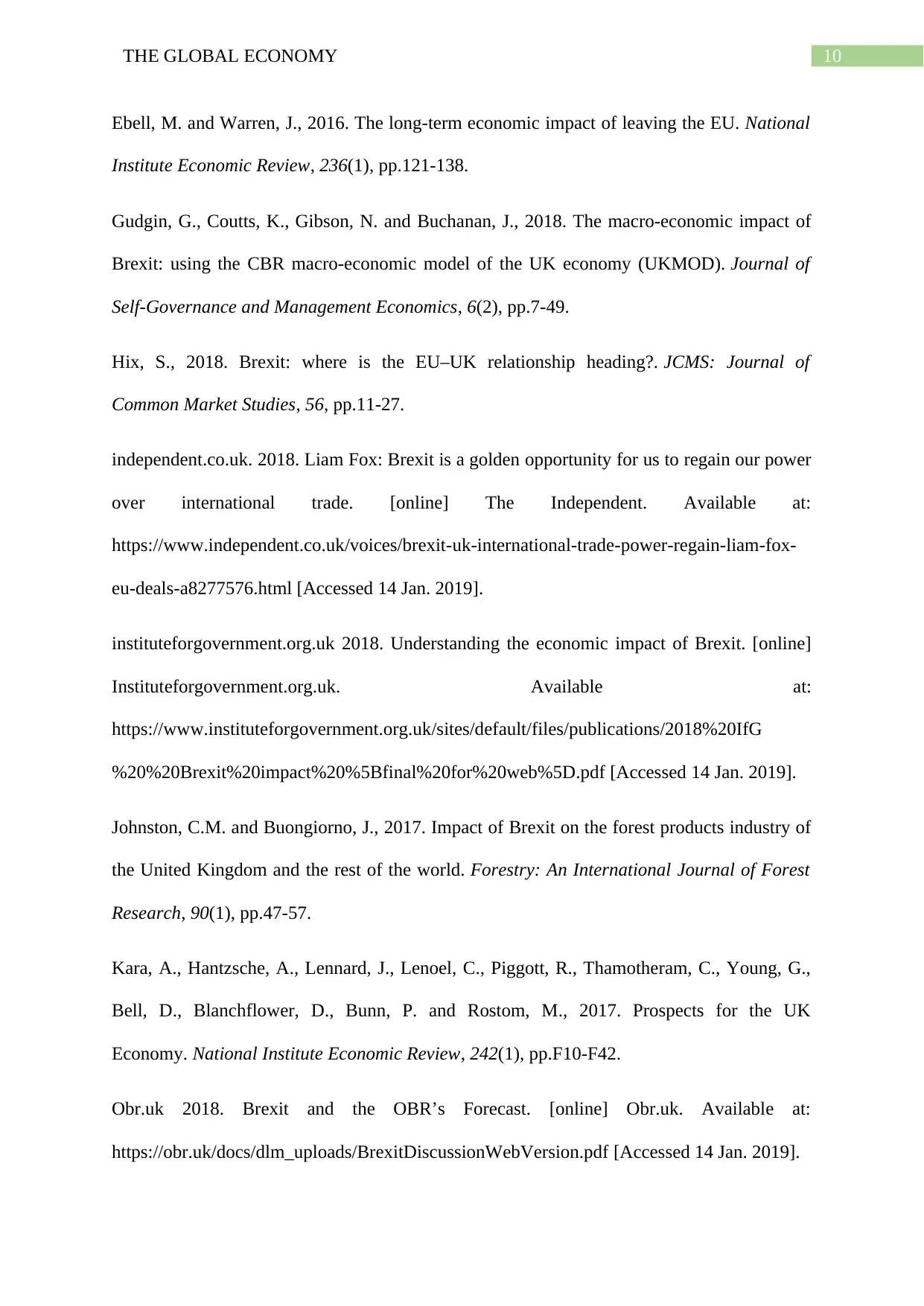
10THE GLOBAL ECONOMY
Ebell, M. and Warren, J., 2016. The long-term economic impact of leaving the EU. National
Institute Economic Review, 236(1), pp.121-138.
Gudgin, G., Coutts, K., Gibson, N. and Buchanan, J., 2018. The macro-economic impact of
Brexit: using the CBR macro-economic model of the UK economy (UKMOD). Journal of
Self-Governance and Management Economics, 6(2), pp.7-49.
Hix, S., 2018. Brexit: where is the EU–UK relationship heading?. JCMS: Journal of
Common Market Studies, 56, pp.11-27.
independent.co.uk. 2018. Liam Fox: Brexit is a golden opportunity for us to regain our power
over international trade. [online] The Independent. Available at:
https://www.independent.co.uk/voices/brexit-uk-international-trade-power-regain-liam-fox-
eu-deals-a8277576.html [Accessed 14 Jan. 2019].
instituteforgovernment.org.uk 2018. Understanding the economic impact of Brexit. [online]
Instituteforgovernment.org.uk. Available at:
https://www.instituteforgovernment.org.uk/sites/default/files/publications/2018%20IfG
%20%20Brexit%20impact%20%5Bfinal%20for%20web%5D.pdf [Accessed 14 Jan. 2019].
Johnston, C.M. and Buongiorno, J., 2017. Impact of Brexit on the forest products industry of
the United Kingdom and the rest of the world. Forestry: An International Journal of Forest
Research, 90(1), pp.47-57.
Kara, A., Hantzsche, A., Lennard, J., Lenoel, C., Piggott, R., Thamotheram, C., Young, G.,
Bell, D., Blanchflower, D., Bunn, P. and Rostom, M., 2017. Prospects for the UK
Economy. National Institute Economic Review, 242(1), pp.F10-F42.
Obr.uk 2018. Brexit and the OBR’s Forecast. [online] Obr.uk. Available at:
https://obr.uk/docs/dlm_uploads/BrexitDiscussionWebVersion.pdf [Accessed 14 Jan. 2019].
Ebell, M. and Warren, J., 2016. The long-term economic impact of leaving the EU. National
Institute Economic Review, 236(1), pp.121-138.
Gudgin, G., Coutts, K., Gibson, N. and Buchanan, J., 2018. The macro-economic impact of
Brexit: using the CBR macro-economic model of the UK economy (UKMOD). Journal of
Self-Governance and Management Economics, 6(2), pp.7-49.
Hix, S., 2018. Brexit: where is the EU–UK relationship heading?. JCMS: Journal of
Common Market Studies, 56, pp.11-27.
independent.co.uk. 2018. Liam Fox: Brexit is a golden opportunity for us to regain our power
over international trade. [online] The Independent. Available at:
https://www.independent.co.uk/voices/brexit-uk-international-trade-power-regain-liam-fox-
eu-deals-a8277576.html [Accessed 14 Jan. 2019].
instituteforgovernment.org.uk 2018. Understanding the economic impact of Brexit. [online]
Instituteforgovernment.org.uk. Available at:
https://www.instituteforgovernment.org.uk/sites/default/files/publications/2018%20IfG
%20%20Brexit%20impact%20%5Bfinal%20for%20web%5D.pdf [Accessed 14 Jan. 2019].
Johnston, C.M. and Buongiorno, J., 2017. Impact of Brexit on the forest products industry of
the United Kingdom and the rest of the world. Forestry: An International Journal of Forest
Research, 90(1), pp.47-57.
Kara, A., Hantzsche, A., Lennard, J., Lenoel, C., Piggott, R., Thamotheram, C., Young, G.,
Bell, D., Blanchflower, D., Bunn, P. and Rostom, M., 2017. Prospects for the UK
Economy. National Institute Economic Review, 242(1), pp.F10-F42.
Obr.uk 2018. Brexit and the OBR’s Forecast. [online] Obr.uk. Available at:
https://obr.uk/docs/dlm_uploads/BrexitDiscussionWebVersion.pdf [Accessed 14 Jan. 2019].

11THE GLOBAL ECONOMY
Portes, J. and Forte, G., 2017. The economic impact of Brexit-induced reductions in
migration. Oxford Review of Economic Policy, 33(suppl_1), pp.S31-S44.
Van Reenen, J., 2016. Brexit’s Long-Run Effects on the UK Economy. Brookings papers on
economic activity, pp.367-383.
Portes, J. and Forte, G., 2017. The economic impact of Brexit-induced reductions in
migration. Oxford Review of Economic Policy, 33(suppl_1), pp.S31-S44.
Van Reenen, J., 2016. Brexit’s Long-Run Effects on the UK Economy. Brookings papers on
economic activity, pp.367-383.
⊘ This is a preview!⊘
Do you want full access?
Subscribe today to unlock all pages.

Trusted by 1+ million students worldwide
1 out of 12
Related Documents
Your All-in-One AI-Powered Toolkit for Academic Success.
+13062052269
info@desklib.com
Available 24*7 on WhatsApp / Email
![[object Object]](/_next/static/media/star-bottom.7253800d.svg)
Unlock your academic potential
Copyright © 2020–2026 A2Z Services. All Rights Reserved. Developed and managed by ZUCOL.





